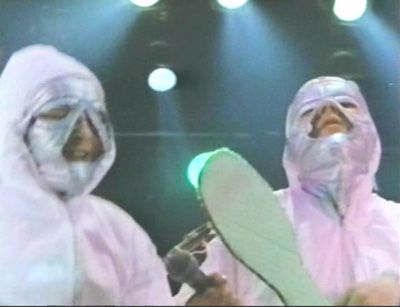 Among the many titles being released through the no-frills Warner Archive Collection are a few oddball orphans and obscurities that didn’t get much love the first time around such as 1971’s Dusty and Sweets McGee, a docudrama of Los Angeles heroin addicts, Carny (1980) starring The Band’s Robbie Robertson, Jodie Foster and Gary Busey, the eccentric Italian sci-fi thriller Wild, Wild Planet (1966) and The Cats aka The Bastard (1968), a Eurocrime drama with Rita Hayworth and Klaus Kinski. These are definitely worth a look but the one that has the potential to make you pogo is Urgh! A Music War (1981), a compilation concert film featuring 33 live music acts recorded in different cities in the U.S. (Los Angeles, New York) and Europe (London; Portsmouth, England, Fréjus, France). Some of the more famous groups featured include X, Devo, The Police, The Go-Gos and The Dead Kennedys but there are also now forgotten acts like Chelsea, John Cooper Clarke and The Alley Cats. And for some reason, Splodgenessabounds, who performed “Two Little Boys,” were completely omitted from the Warner Archive DVD-R.
Among the many titles being released through the no-frills Warner Archive Collection are a few oddball orphans and obscurities that didn’t get much love the first time around such as 1971’s Dusty and Sweets McGee, a docudrama of Los Angeles heroin addicts, Carny (1980) starring The Band’s Robbie Robertson, Jodie Foster and Gary Busey, the eccentric Italian sci-fi thriller Wild, Wild Planet (1966) and The Cats aka The Bastard (1968), a Eurocrime drama with Rita Hayworth and Klaus Kinski. These are definitely worth a look but the one that has the potential to make you pogo is Urgh! A Music War (1981), a compilation concert film featuring 33 live music acts recorded in different cities in the U.S. (Los Angeles, New York) and Europe (London; Portsmouth, England, Fréjus, France). Some of the more famous groups featured include X, Devo, The Police, The Go-Gos and The Dead Kennedys but there are also now forgotten acts like Chelsea, John Cooper Clarke and The Alley Cats. And for some reason, Splodgenessabounds, who performed “Two Little Boys,” were completely omitted from the Warner Archive DVD-R.
The basic format of Urgh! A Music War is to simply present the bands in a seemingly random order with no narration or commentary that might provide some context for their inclusion. Each group or performer gets to play one song (most of them are roughly under six minutes or less) with the exception of The Police who serve as bookends, opening the film with “Driven to Tears” and closing it down with “Roxanne.” They also lead the end credit roll with a sing-a-long to their song, “So Lonely.” 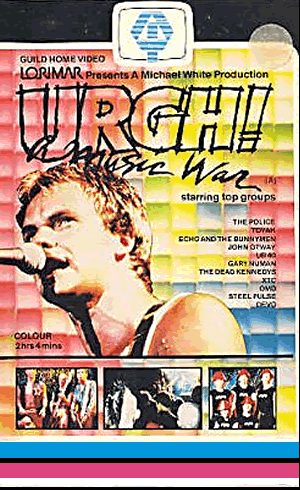 Urgh! A Music War was filmed during 1980 and released in 1981 to capitalize on the punk scene, which was already quickly fading as noted in Penelope Spheeris’s much more focused The Decline of Western Civilization released the same year. It was also targeted toward fans of The Police who had become an international music phenomenon.
Urgh! A Music War was filmed during 1980 and released in 1981 to capitalize on the punk scene, which was already quickly fading as noted in Penelope Spheeris’s much more focused The Decline of Western Civilization released the same year. It was also targeted toward fans of The Police who had become an international music phenomenon.

The Police in their early years – Sting, Andy Summers, Stewart Copeland (from left to right). Photo by Martyn Goddard, Getty Images
The main reason for this is because the two masterminds behind the lineup of bands were Ian and Miles Copeland, the brothers of drummer Stewart Copeland of The Police, and rock promoter/record producers in the industry. Miles founded IRS Records and Ian’s talent agency managed The Smiths, The Bangles and others at one time. So it made perfect sense to build a concert film around their most popular act, The Police.
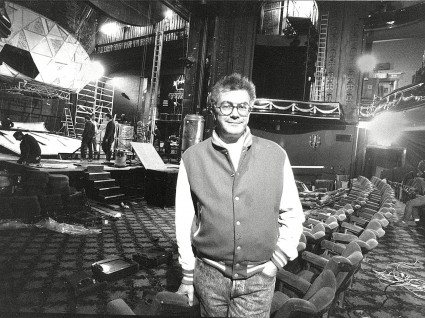
British impresario Michael White got his start producing stage productions like the controversial Oh! Calcutta and later moved into film production with Monty Python and the Holy Grail and other titles. Urgh! A Music War was his only foray into the concert film genre.
Initially, the project began with British entrepreneur Michael White, producer of the London stage productions of Joseph and the Amazing Technicolor Dreamcoat and The Rocky Horror Show (before it was adapted to the screen in 1975 as The Rocky Horror Picture Show). According to some sources, Jonathan Demme (Stop Making Sense, Neil Young: Heart of Gold) was planning to direct Urgh! and introduce some of his favorite new bands like The Feelies, Bush Tetras and Joe “King” Carrasco but he bowed out once I.R.S. management was brought on-board by White. 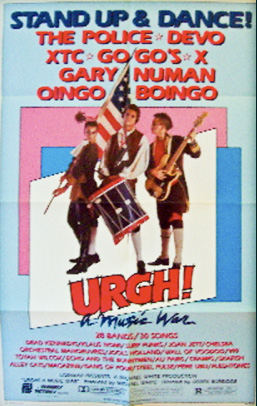 Despite having The Police as headliners and several other potentially enticing musical acts, Urgh! was not a boxoffice success. For one thing, it was poorly distributed and had few bookings outside the Landmark Cinema chain in selected cities. The title didn’t help either. What the hell is Urgh! A Music War supposed to mean? If it was a battle of the bands, was there a prize at stake? The collection of groups is also all over the map, giving the impression that this was a major mishmash. Well, it was and is, but what a wonderfully fun record/time capsule of the music scene in 1980! This is truly an unclassifible animal that embraces punk (The Dead Kennedys), reggae (Steel Pulse), new wave (Devo) and various rock mutations (The Fleshtones). Even obscure acts such as Athletico Spizz 80 (spraying Crazy String into the crowd as they perform “Where’s Captain Kirk?”) retain a curiosity value…at least for me.
Despite having The Police as headliners and several other potentially enticing musical acts, Urgh! was not a boxoffice success. For one thing, it was poorly distributed and had few bookings outside the Landmark Cinema chain in selected cities. The title didn’t help either. What the hell is Urgh! A Music War supposed to mean? If it was a battle of the bands, was there a prize at stake? The collection of groups is also all over the map, giving the impression that this was a major mishmash. Well, it was and is, but what a wonderfully fun record/time capsule of the music scene in 1980! This is truly an unclassifible animal that embraces punk (The Dead Kennedys), reggae (Steel Pulse), new wave (Devo) and various rock mutations (The Fleshtones). Even obscure acts such as Athletico Spizz 80 (spraying Crazy String into the crowd as they perform “Where’s Captain Kirk?”) retain a curiosity value…at least for me.
The few critics who reviewed the movie at the time were mostly unimpressed such as Robert Palmer of The New York Times, whose opinion was shared by many: “Apparently, the idea behind the format was that the film be ”democratic” and reflect the anti-elitist sentiments of the movement it documents. But few rock groups can communicate much of what they stand for or are capable of in one song. Urgh! is a jumble, and a misleading jumble. Some of its strongest and most significant bands – X, UB40, The Cramps, The Au Pairs – are represented by snippets that fail to indicate the dimensions of their talent or to reproduce a fraction of the excitement they can create…There are some bright spots – a riveting exercise in the building and releasing of musical tension by the Gang of Four, a joyous ”We Got the Beat,” from the Go Go’s. But they aren’t enough to salvage a rushed, uneven film.”

Gang of Four performs “He’d Send In the Army” in the concert film, Urgh! A Music War (1981), directed by Derek Burbidge.
Other music critics echoed Palmer’s complaint of showcasing these bands in large scale performance venues which were not how most music fans experienced them. Why not capture them in the small clubs and bars where their music had a much more intense and intimate connection with their audiences?
Seeing all of these groups out of context and for only brief moments in the spotlight is not the best way to experience them, especially for new audiences. And yes, the film lacks stylistic distinction; the cinematography is rarely creative or inspired and so is the editing. The few attempts to weave in other footage are lame (punk kids on the streets of London interspersed with Echo and the Bunnyman’s rendition of “The Puppet”). We’re often subjected to the same crowd shots (especially in the L.A. sequences) and some of the groups aren’t at their best here (The essential X on film is in Spheeris’s The Decline of Western Civilization).
But none of this really bothers me because Urgh! A Music War works on so many other levels. There is a sense of exhilaration in some of the performances while others express self-conscious irony or genuine anger without regard for the audience. And it’s a cultural artifact that transports me back to another time and place, often makes me laugh and puts me in an unreasonably happy mood.
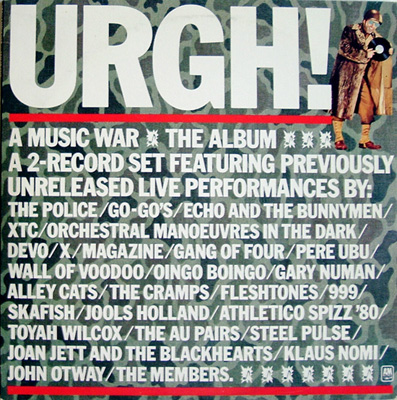
The LP soundtrack album for Urgh! A Music War is now out of print and unlikely to be re-released on any format due to music rights issues.
Because of the film’s low visibility over the years, it’s acquired something of a mythic reputation, partly due to its confusing history. The theatrical release of Urgh! A Music War ran 96 minutes. A later video release ran 124 minutes featuring additional acts cut out of the theatrical print. Then Night Flight on the USA Network aired an altered version that included material not originally filmed for the movie featuring such groups as The Alley Cats and Wall of Voodoo. I, like most people, never got a chance to see Urgh! A Music War during its initial release but I finally caught up with a screening of it a few years ago in Los Angeles as the Egyptian Theater. 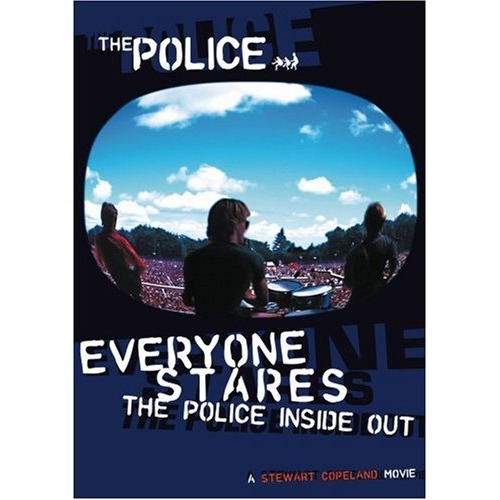 It was presented by the American Cinematheque on a double bill with the premiere of Stewart Copeland’s Everyone Stares: The Police Inside Out (2006) with Copeland in attendance. Copeland’s homemade documentary of the super-8 footage he took during his years touring with The Police was like a video scrapbook that had its moments of interest but Urgh! was the real treat and I went searching for the soundtrack CD immediately after the screening. Of course, it had been out of print for years and still is….but now with the Warner Archive release, you have the entire 124 minute version on DVD.
It was presented by the American Cinematheque on a double bill with the premiere of Stewart Copeland’s Everyone Stares: The Police Inside Out (2006) with Copeland in attendance. Copeland’s homemade documentary of the super-8 footage he took during his years touring with The Police was like a video scrapbook that had its moments of interest but Urgh! was the real treat and I went searching for the soundtrack CD immediately after the screening. Of course, it had been out of print for years and still is….but now with the Warner Archive release, you have the entire 124 minute version on DVD.  Unfortunately Warner Archive didn’t bother to remaster the film to improve the visual and audio quality (it looks like it came from a video source). The only extra is the trailer for the film and you can’t access each performer through a chapter listing. Instead, the DVD-R is sequenced in ten minute increments with little concern for whether it is starting at the end or beginning of a performance.
Unfortunately Warner Archive didn’t bother to remaster the film to improve the visual and audio quality (it looks like it came from a video source). The only extra is the trailer for the film and you can’t access each performer through a chapter listing. Instead, the DVD-R is sequenced in ten minute increments with little concern for whether it is starting at the end or beginning of a performance. 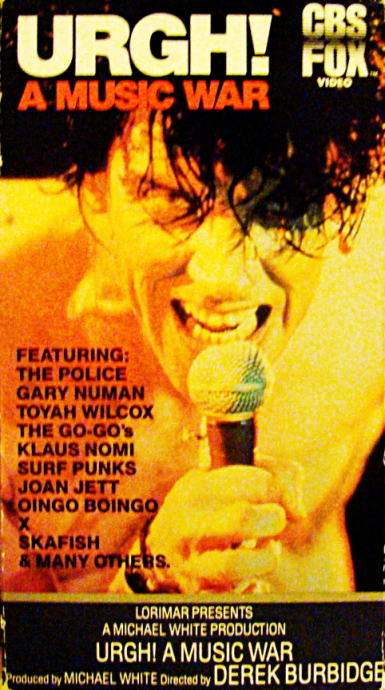 Still, I’m happy that Urgh! got a release at all and I still enjoy subjecting friends to it who had no idea of its existence. It would be amazing to see a Blu-Ray edition some day but that is a pipe dream; the music rights alone would probably make that prohibitive. Meanwhile, here are some of my favorite moments in Urgh!:
Still, I’m happy that Urgh! got a release at all and I still enjoy subjecting friends to it who had no idea of its existence. It would be amazing to see a Blu-Ray edition some day but that is a pipe dream; the music rights alone would probably make that prohibitive. Meanwhile, here are some of my favorite moments in Urgh!:
Klaus Nomi “Total Eclipse”
Looking like a more effete Riff-Raff from The Rocky Horror Picture Show, Nomi takes the stage and launches into his rock opera-like song using that multi-range octave voice of his. Our first glimpse of Nomi starts with his footwear and travels up from there to this alien persona with white minstrel gloves. It’s hard to know where to look with so many visual hooks competing with each other; the black dancers with white highlights for eyebrows gyrate furiously in their leotards while the backup band, dressed in their all-white ABBA wardrobe, keep the electronic beat. Nomi was a truly unique performer and those with any interest should check out the documentary, The Nomi Song (2004), which also features this famous clip. Unfortunately, the German-born Nomi was an early AIDS casualty (he died in 1983), ending a career that was just getting started.
Gary Numan “ Down in the Park”
According to some sources, this musical segment was the only one not originally produced for Urgh!. It supposedly was an excerpt from the concert film Micromusic, filmed by Derek Burbridge, the director of Urgh! While a grim-faced Numan motors about the stage in a reconverted golf cart singing words of doom about a lethal future world, fog machines work overtime, neon lights blink and strobe and we get a genuine “theatrical” performance.
The Au Pairs “Come Again”
In the hypnotic, stripped-down style of Gang of Four (who also appear in the film performing “He’d Send in the Army”), The Au Pairs have an intense presence which is in perfect keeping with their angry, leftist music. It sounds great and you can dance to it while lead singer Lesley Woods sarcastically skewers sacred cows from her feminist viewpoint.
Invisible Sex “Valium”
Little is known about this novelty act that appears in the London portion of the show but I was sure of one thing. I had definitely NOT seen this performance in the theatrical print of Urgh! because I would have remembered it. On a first viewing I was helpless with laughter. I’m not sure what is the most absurd aspect of their act. Is it the fact that there are so many of them, half of whom are singers and/or dancers, all dressed in white nylon body suits with metallic colored face masks (Was Santo, the Mexican wrestler superhero, their inspiration?). Or is it the insane call-and-response chorus which gets into crazy Japanese pop territory? And what is up with that big guitar riff break with several non-musical members doing synchonized air guitar moves with cardboard guitar props? Their act might be a one-shot gimmick but I find myself enjoying “Valium” more and more each time I hear it.
Pere Ubu “Birdies”
I was late in discovering Pere Ubu’s music and had never encountered them until I saw them perform “Breath” on Sunday Night, a short-lived music show (1988-1990) hosted by David Sanborn and Jools Holland (who has a solo keyboard number in Urgh!). If there is such a thing as avant-garde rock, this is it and singer David Thomas has a mesmerizing stage presence with an unpredictable vocal style that can go from a wail to a shout to semi-melodic singing, all of it infused with a touch of paranoia and madness. “Birdies” was one of the numbers originally cut from the theatrical print, along with Chelsea’s “I’m on Fire,” The Members’ “Offshore Banking Business,” the aforementioned “Valium” and six others, yet it’s a highpoint for me.
Devo “Uncontrollable Urge”
Pure fun and a perfect example of what Devo was all about on stage. This also happens to be one of the better edited and photographed musical acts in Urgh!

Toyah Willcox gives a fearless, physically exhaustive performance of “Danced” in Urgh! A Music War (1981).
There are plenty of other memorable moments in this sprawling concert film, some of which are entertaining for all the wrong reasons. For example, Toyah Willcox’s “Danced” is not very compelling as music but Willcox, who was first discovered by Derek Jarman in his 1977 punk fantasy Jubilee, is unintentionally funny as a performer here. Jumping up and down and pumping her fists repeatedly in the air, the dayglo orange-haired singer looks more like a demonic jazzercise instructor leading her class through a frantic weight-loss routine. In what probably makes sense as a progressive career path since then, Willcox has provided voiceover for Teletubbies, the British children’s TV show, and written a book about her cosmetic surgery experiences, Diary of a Facelift.

Jello Biafra of The Dead Kennedys gives a sweat-drenched rendition of “Bleed for Me” in Urgh! A Music War (1981).
Then there’s the occasional odd moment: a boy groupie jumps on the stage during The Go-Gos’ “We Got the Beat” number and does a quick ring around lead vocalist Brenda Carlisle while grabbing at his pants. It looks like he’s about to pull the full monty when he leaps back into the audience to escape security. And one is always struck by just how YOUNG some of these musicians look. Vocalist Ian McCulloch, of Echo and the Bunnymen, looks about 15 but so does Joan Jett and a host of others. And Jello Biafra of The Dead Kennedys almost looks innocent here.
Here is the full songlist as performed in the 124 minute cut of Urgh! A Music War:
- The Police – Driven to Tears
2. Wall of Voodoo – Back in Flesh
3. Toyah Willcox – Danced
4. John Cooper Clarke – Health Fanatic
5. Orchestral Manoeuvres in the Dark – Enola Gay
6. Chelsea – I’m on Fire
7. Oingo Boingo – Ain’t This the Life
8. Echo & the Bunnymen – The Puppet
9. Jools Holland – Foolish I Know
10. XTC – Respectable Street
11. Klaus Nomi – Total Eclipse
12. Athletico Spizz 80 – Where’s Captain Kirk?
13. The Go-Go’s – We Got the Beat
14. Dead Kennedys – Bleed for Me
15. Steel Pulse – Ku Klux Klan
16. Gary Numan – Down in the Park
17. Joan Jett and the Blackhearts – Bad Reputation
18. Magazine – Model WorkerDisc 2
1. Surf Punks – My Beach
2. The Members – Offshore Banking Business
3. Au Pairs – Come Again
4. The Cramps – Tear It Up
5. Invisible Sex – Valium
6. Pere Ubu – Birdies
7. Devo – Uncontrollable Urge
8. The Alley Cats – Nothing Means Nothing Anymore
9. John Otway – Cheryl’s Going Home
10. Gang of Four – He’d Send in the Army
11. 999 – Homicide
12. The Fleshtones – Shadowline
13. X – Beyond and Back
14. Skafish – Sign of the Cross
15. Splodgenessabounds – Two Little Boys
16. UB40 – Madame Medusa
17. The Police – Roxanne / So Lonely
18. Klaus Nomi – Aria (from Samson and Delilah)
Other websites of interest:
https://www.chicagoreader.com/chicago/argh-its-urgh/Content?oid=1188614
http://10thingszine.blogspot.com/2009/08/urgh-music-war-finally-released-on-dvd.html
http://nightflight.com/war-and-punk-behind-the-lines-at-the-80s-music-doc-urgh/
http://houseofselfindulgence.blogspot.com/2011/12/urgh-music-war-derek-burbidge-1981.html
https://everything2.com/title/Invisible+Sex




